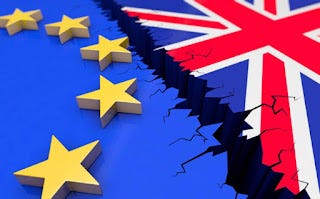Hope in Uncertain Times
On the 22nd February 2016 David Cameron announced that there would be a referendum on whether we should leave the EU. Three years later and the political debate is still rumbling on. The debate became increasingly acrimonious and divisive over the course of the campaign and it has continued to dominate headlines since the vote on the 23rd June 2016. The disputes within and between the political parties have continued and we see the same divisions reflected in our society. Half our nation is hopeful for our future outside the EU, the other half is concerned for the future and grieving for what they feel is lost. Views are very polarised and there is little proper dialogue that seeks understanding between people from both the leave and remain camps.

At the time of writing, with no agreed deal for Brexit, the country seems to be running to a standstill. Businesses, the NHS, supermarkets, car manufacturers, banks, airlines, aircraft manufacturers and many more are all holding their breath waiting to see what the outcome will be. As W. Somerset Maugham wrote in 1938, ‘We live in uncertain times and our all may yet be taken from us.’ Regardless of how people voted in 2016, I don’t think anyone voted for the situation in which we now find ourselves. Many people are fearful about what the future will bring and all the more so as the Brexit deadline approaches. Despite all the effort put into finding a political and economic solution, agreement has still not been reached. However, there has been little or no focus on trying to resolve the tensions that have been created in our society. Part of the challenge is that the shock and hurt that’s been experienced by the half our population has never been properly acknowledged. There are equally strong feelings on both sides of the debate and to brush the views of nearly half those that voted aside with statements like, ‘the will of the people’ does not help with any reconciliation and healing. If the vote had been marginally in favour of remaining, then the issues of a split in our society would still be the same, with the same need for reconciliation and healing. I chair a lot of different groups and teams and if ever we have a 50/50 (or close) split on a decision, then I take that as a call for more discussion, not as a ‘mandate’ for action. However, whatever we may think of the process since 23rd June 2016, we are where we are. I am sure that all sides will continue to lobby for their preferred outcome up to and beyond the 29th March, and rightly so. Whatever the final outcome, I’m concerned for how we move forward as a nation. I believe that if we are going to begin to heal the divisions in our society, then one thing we have to do is look for ways to serve each other.Around A.D. 50, St Paul wrote a letter to the churches in Galatia that were experiencing conflict because of different views on how to follow Jesus. In Galatians 5:14-15 he wrote:…use your freedom to serve one another in love; that’s how freedom grows. For everything we know about God’s Word is summed up in a single sentence: Love others as you love yourself. That’s an act of true freedom. If you bite and ravage each other, watch out—in no time at all you will be annihilating each other, and where will your precious freedom be then?In the midst of the storms in our nation… in the uncertainty for the future, in the frustration, anger and hatred we see growing in our society, in the disputes within the houses of parliament, in the grief experienced by many… in the midst of these storms, I believe that Christians are called to seek and serve Christ in all people, bringing peace where there is anger, hope where there is despair, healing where there is brokenness, reconciliation where there is division and in all these situations loving our neighbours as ourselves. History shows that the Church has sometimes lost sight of that, but it is called to serve in that way; loving our neighbours as ourselves. Whatever the future holds, whatever faith or belief we may have, and whether we are for or against Brexit, if we each take responsibility for serving others in that way, then maybe there is hope that we can begin to rebuild and reunite our nation.Rev Barry Jackson



